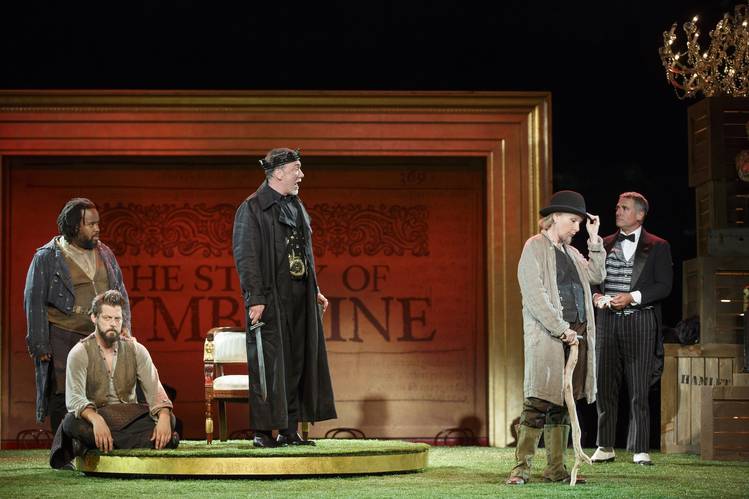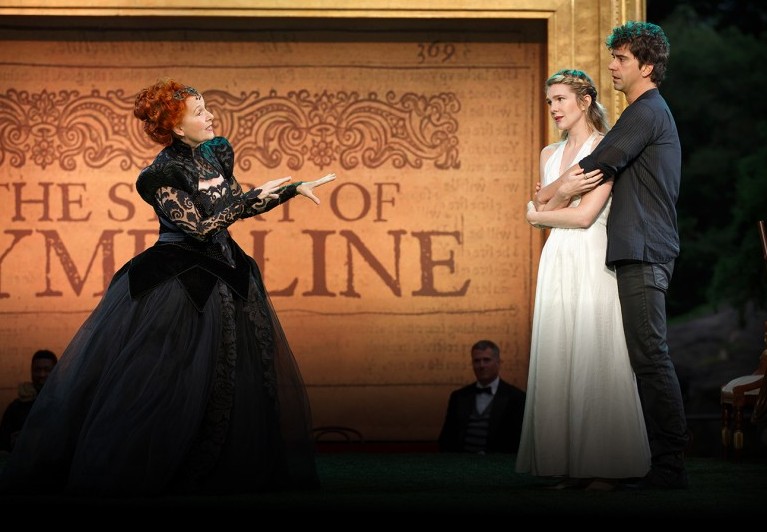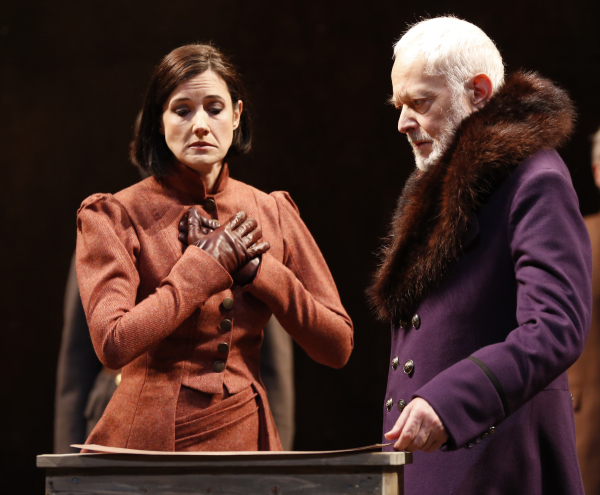by JK Clarke
The ongoing revival and embrace of Shakespeare’s later plays, those generally referred to as the “Romances,” has led to the inevitable production of his lesser appreciated and, some would say, weaker plays. While the New York theater scene has been rife with productions of The Winter’s Tale, Pericles and The Tempest, it is The Public Theater that has dared to mount, as the second Shakespeare in the Park play of the summer, Cymbeline, a little known, seldom seen, and structurally difficult play. But, thanks to a terrific cast and director the result is a delightful, wildly entertaining show.
While all of the Romances require more than the usual suspension of disbelief, Cymbeline is rife with credibility gaps. While these plays tend to have a mix of heartbreaking tragedy and moments of redemption, modern dramatists have generally concluded that the best approach to Cymbeline is to make light of its more serious moments. Which is how director Daniel Sullivan (who helmed last summer’s brilliant King Lear at The Delacorte) has created such a delightful show. It plays like an outrageous Brothers Grimm fairy tale, where terrible things happen but the moral plays out and everyone is happy in the end.
If you strip away all the twists, the story is pretty straightforward: Cymbeline (Patrick Page), King of Britain, is enraged that his daughter Imogen (the delightful Lily Rabe) has married an unworthy young man, Posthumus Leonatus (Hamish Linklater), apparently making him sole heir to the throne, so he banishes him. While banished, Posthumus makes a boastful wager with an Italian nobleman and rascal, Iachimo (delightful Raúl Esparza), asserting that Imogen is the most devoted and faithful woman on earth who cannot possibly be seduced by another man. It turns out his boast is correct, but Iachimo is devious and illegitimately obtains “proof” of his conquest. Meanwhile, the Queen (the great Kate Burton), Cymbeline’s second wife is our story’s “evil witch,” (dressed in an elaborate, high shouldered black dress for emphasis, à la Glenn Close as Cruella de Vil) and she wants her jerk of a son, Cloten (also Hamish Linklater, but channeling Dax Shepard’s character in the Mike Judge film, Idiocracy) to ascend the throne. Naturally, as in all fairy tales, the way she chooses to make this happen is by poisoning the princess. Imogen ends up on the run dressed as a servant boy (of course), and encounters her long-ago abducted brothers, Guiderius (David Furr) and Arviragus (Jacob Ming-Trent) who’ve been raised ‘lo these 20 years by wise old banished general Belarius (also Kate Burton playing a delightful old peasant man, in rather stark contrast to her captivating evil Queen). Finally after a battle with the Romans (long story), Posthumus rescues the King, earning his love and respect, all parties are re-united and there is much rejoicing.
This is the super-charged Shakespeare comedy of catastrophes with an improbable, but tidily wrapped, redemptive conclusion. It is so outrageous that it simply must be played over-the-top and the heavier parts (including a gruesome beheading!) have to be subdued. And that’s what we get. The play starts with a cavalier opening with Furr and Ming-Trent taking over the first scene—originally a dialog between “two gentlemen”—and turns them into a Chorus, who explain the King’s anger and introduce the characters to actual audience members (in the first four rows on either side of the stage) who get to awkwardly ask scripted questions, like at a politician’s press conference. Thus clearing up the likely confusion an uninitiated audience would have about the storyline.There are light touches like this all along the way. What’s more, bringing to mind Austin Pendleton’s terrific production of Hamlet at CSC this past spring, there are moments when a character (say, Imogen) sits in a chair at the edge of the stage during a scene that she ordinarily would not and should not witness (say, Posthumus making his wager with Iachimo), thereby rendering all the potentially serious and heavy moments of the play completely impotent and irreverent. The finishing touches that certify the play’s levity and mythical proportions are Riccardo Hernandez’s set which is suggestive not of a room or a physical place, but of a gilded picture frame within still another picture frame.
While Daniel Sullivan can take full credit for pulling together a delightful production, he is bolstered by solid acting from every single member of the cast. Everyone involved appears to be having a terrific time with the production, and their enthusiasm is infectious. From Burton to Ming-Trent and even to Teagle F. Bougere, (who plays multiple secondary roles and makes great hilarity of swapping character and costume mid-scene), the cast simply shimmers.
Most of all, however, this is Lily Rabe’s play. Just as in last summer’s Much Ado About Nothing at the Delacorte, Rabe has such command of the text and makes Shakespeare so very accessible, even to Shakespeare newbies (a trait which could not be more important at the all-access Shakespeare in the Park). Cymbeline is really Imogen’s play, for she is repeatedly betrayed, and put through every imaginable type of emotional turmoil. Rabe handles the full range of Imogen’s emotions believably and stirringly. When Imogen, upon hearing she’s been accused of infidelity, laments, “I have heard I am a strumpet, and mine ear,/ Therein false strook, can take no greater wound,” we feel her pain and are weeping along with her.
With Cymbeline, The Public Theater has once again proven that even the most inaccessible of Shakespeare’s plays can be totally delightful and fulfilling. It just takes an inspired production team and a group of magnificent actors. This is a Shakespeare rarity that shouldn’t be missed and is a perfect way to enjoy the waning days of summer in Central Park.
Cymbeline. Through August 23 at The Delacorte Theater (Central Park near 81st Street and Central Park West entrance). www.publictheater.org


























